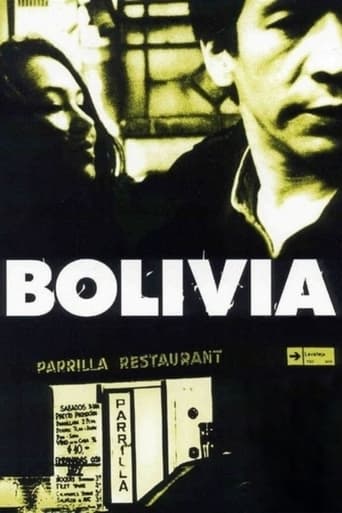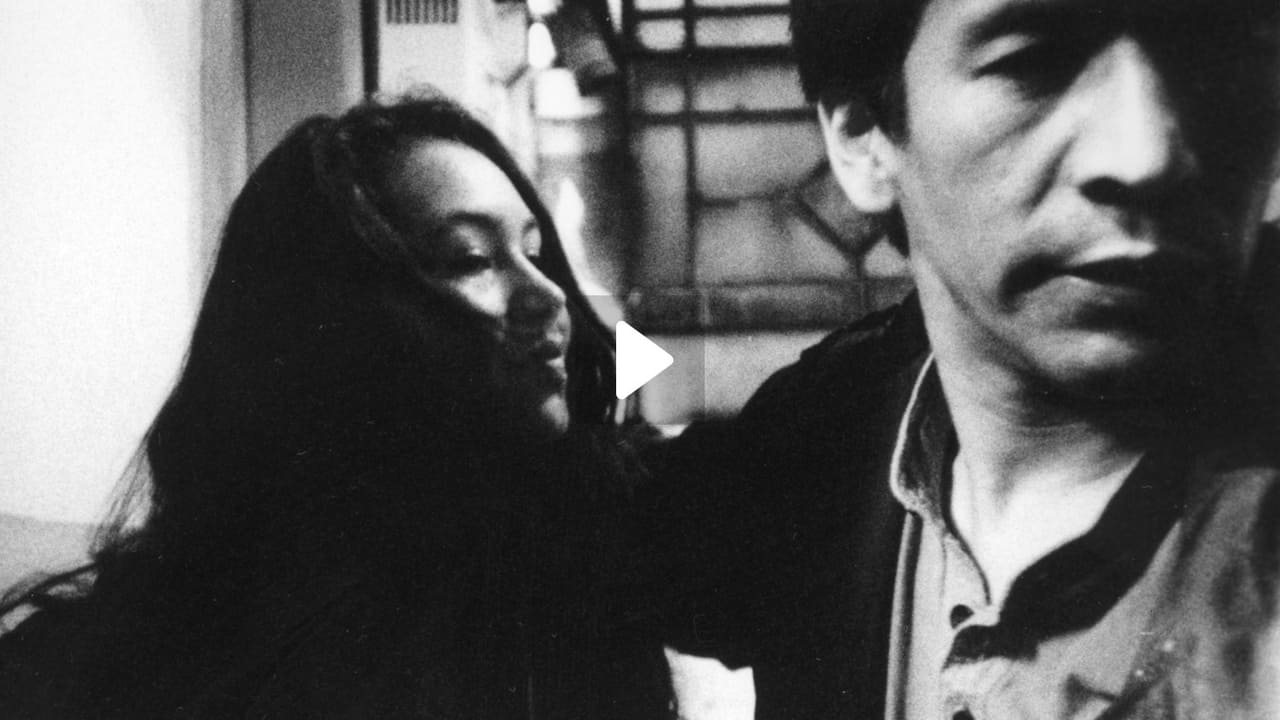dfwforeignbuff
Bolivia (2001) This is the first feature-length film from director Israel Adrian Caetano. It was an Argentinean & Dutch Production. Filmed in black & white & on a low budget the film was shot 3 days a week over a period of three years. Kind of a neo-realism slice of life film the mostly plot-free film is confined to a café-bar in the lower-middle class Buenos Aires suburb of Villa Crespo, with few trips outside. It tells the story of Freddy (Freddy Flores), a Bolivian with a gentle disposition, who, after Americans burn down the coca fields where he is employed, loses his job. With little work opportunities in Bolivia, he leaves his wife & three daughters & travels to Argentina to search for employment as an undocumented worker. He hopes to make money & later return to his family. He lands a job as a grill cook in a seedy Villa Crespo café where the owner (Enrique Liporace) is happy to skirt Argentinean immigrant laws in order to secure cheap labor. It is in this café that Freddy meets the characters who affect his life: Rosa (Rosa Sanchez), a waitress of Paraguayan/Argentine descent, & an outsider by virtue of her mixed heritage; Hector (Hector Anglada), a traveling salesman from the province of Córdoba who's gay; a Porteno taxi driver (Oscar Bertea), & one of the driver's buddies. Freddy also has to deal with various Argentine café patrons who view all Paraguayans & Bolivians with disdain due to their ethnicity. The film gives us a realistic portrayal of racism immigrant labor & prejudices in Argentina. Cateano used professional & non professional actors. Freddy Flores was a local non professional. Other reviewers state this film is for art film students only. I disagree. All interested in foreign film & film in South America & Argentina will like this film. It very realistic & I enjoyed it. This short 75 minute film about poverty, intolerance, violence, & despair in contemporary Argentina is powerful & I recommend it. This is a universal story. 3 or 4 stars.
llanero
plot=0 shooting=0 script=1 direction=5 photography=nil acting=pretty poorThis movie could have been entirely shot with a personal VCR. The script could have been written by an average Argentinian on a piece of paper, nothing original. Perhaps it causes a certain effect on people outside Argentina, but I can compare it with below-mediocre locally oriented films such as "The Firm" or "Meantime" from the UK. Sorry, this film does not do for me, there is no art behind this socially motivated short story. In the same line of socially motivated films you'll find finer examples on Argentine cinema: "Buenos Aires, Viceversa" or "El Polaquito". I have to believe this film was more an experiment than a full scale movie.
jotix100
Argentina, like some countries in the industrialized world, is being invaded by illegal immigrants from neighboring countries, mainly, Paraguay and Bolivia, where the poorly paid workers believe in going away in search of badly needed money to feed the family they left behind. These poor, unskilled workers are in for a big surprise: the people of the countries they immigrate to, don't want them! Never mind they only take the work that no one else wants to do.The story of Freddy, a Bolivian, is probably universal. As he arrives in Buenos Aires, he finds work in the small restaurant owned by Enrique, who promises to pay Freddy fifteen pesos a day, which is not even five dollars! With that, Freddy has to live and try to save to send home to his wife and children in La Paz. Freddy is expected to work from 7 in the morning until late at night. He is basically the only employee in the place, where he is a cook, tends bar, and does everything the boss, Enrique expects him to do. The other employee, Rosa, is from Paraguay.At the bar, a series of low-life individuals gather to socialize, watch television, as they use the place as their own club. Oso, the unemployed taxi driver is the first one to show his own prejudice against Freddy, who has not been disrespectful to him. Oso complains about how the illegals are taking over. He knows it well because, he, himself, is from Uruguay and has found a home in Buenos Aires. Oso will be instrumental in what happens to Freddy at the conclusion of the story.After his first day in the restaurant, we follow Freddy as he roams the streets of the neighborhood next to the place he works. He is stopped by two policemen who not only are rude to him, but in their eyes, he is guilty of something they haven't decided about. Freddy ends the night in a lonely bistro where he orders coffee and falls asleep. Rosa, the kind waitress, takes pity on him the following night and takes him to the hotel where she has a room. Before that, they have stopped at a club that caters to Bolivians, and Freddy, who has drunk a bit too much, makes a pass at Rosa.Adrian Caetano, the director, also co-wrote the screen play with Romina Lafranchini. "Bolivia" packs a lot in only 75 minutes of screen time. Mr. Caetano plays with our emotions in the way he presents a good man who is willing to work, yet, circumstances beyond his control make him the butt of the hatred people feel about the poor immigrant who is only doing a minimal job to survive. Mr. Caetano, uses the gritty black and white cinematography of Julian Apezteguia to surprising results.Freddy Flores is seen as the Bolivian man trying to eke out a living for himself and his family. Mr. Flores is a natural, as we never feel he, or for that matter, the rest of the cast, acting. Rosa Sanches is perfect as the stoic waitress who never tells us anything about herself. Enrique Laporace makes an excellent contribution as the owner of the restaurant. Oscar Bertea plays the brutish Oso."Bolivia" is a small film, but it holds our attention because of what director Adrian Caetano has done with the story about human beings that roam the globe in search of a meager salary, for them and their families, only to get the scorn from the people that benefit from their labor.
hkesselm
The life of illegal immigrants, in Buenos Aires or in another place in the world, is a black & white life, the colors are off. For telling the routine of a Bolivian cook, alone, sleeping in a bar, with his wife and children living 1500 miles away, disturbed everyday by police asking for his papers, white and black are enough. You won't find here famous actors or great special effects. Almost the whole movie occurs in a cheap neighbourhood bar. But the story is universal, it could be a Turkey in Munich, a Tunisian in Marsella or a Mexican in Los Angeles.Hector Kesselman, Buenos Aires, Argentina


 AD
AD
